The Early Literacy Collaborative Toolkit
We are excited to share, “He is Especially Smart and Has Wisdom”: A Guide to Co-designing Critical Literacies with Black Families, a toolkit prepared for family leaders, community members, educators, and school leaders interested in partnering with Black families in school or community spaces to establish collaboration processes and learning practices that can extend to a wide range of classroom subjects. The toolkit consists of four sections:
- Early Literacy Collaborative: Brief overview of our codesign project with Black families, Black boys, educators, school and district leaders, and researchers across three SPS elementary schools.
- Indicators of Impact: What we learned from the project and what changed, including data about the impact of ELC participation on students, families, and educators.
- ELC Practices & Activities: Three central practices in the ELC process and sample activity lesson plans from each – (a) fostering relationships and building from existing relationships, (b) grounding in family and community ecologies, and (c) cultivating intergenerational learning.
- Planning Workbook: Putting these Practices into Practice: A workbook for family leaders, educators, community members, and school leaders to engage with individually and as an organizing team, to begin mapping out a codesign initiative with Black families. Followed by the appendix, which includes language for school leaders to add to their School Improvement Plans.
Together, we hope this toolkit allows family leaders, community members, educators, and school leaders to foster collaboration with families and center family and community expertise in developing learning tools. We hope it provides an insightful window into our work and actionable steps you can take to codesign similar efforts. We invite you to utilize this toolkit in ways that best suit you and your communities’ needs!
If you would like to stay up-to-date with ELC resources, please sign up for our mailing list.

To subscribe, add your email address and name (optional) under “Subscribing to ELCupdates”. Once subscribed, you will need to confirm the subscription by clicking the link emailed to you. You will then receive email updates about the ELC!
Overview of the Early Literacy Collaborative
Most recently, the Research-Community-Practice Partnership (RCPP) has been working on the Early Literacy Collaborative (ELC). The ELC is a codesign project that fosters families’ transformative agency and Black boys’ engagement in critical literacies to promote racial equity across the school system. In the ELC, educators and school leaders learn from and collaborate with Black families and communities, particularly their deep expertise, histories, knowledges, priorities, languages, and cultural practices. Rather than construct a space where families learn from school leaders and educators, the paradigm shift that underlies the ELC is for school leaders and educators to learn from families and students’ literacy practices.
Although critical literacy is our an entry point for the codesign, the key focus is to reshape the relational dynamics and routines in schools by designing a collaborative space where families connect with one another and educators/school leaders, draw on their expertise and ancestral knowledges, and foster agency in transforming their schools. In other words, we are trying to establish processes of collaboration and learning practices that can extend to other classroom subjects, like math, science, etc.


Identity-Affirming Critical Literacies
Expansive definitions of literacy are more than school-based writing, reading, and problem solving. Literacies are grounded in culture, history, and language, and develop in rich ways in home and community spaces. Family literacy practices look like stories of migration, traditional recipes, songs, or Ikub (Ethiopia/Eritrea)/Hagbad (Somalia), which are traditional practices that teach Black youth about collective saving to sustain financial and emotional wellness.
The ELC consists of Black boys in 2nd – 4th grade, their families, educators from Emerson, Olympic Hills, and Wing Luke elementary schools, the Office of African American Male Achievement, community-based partners, and researchers from the University of Washington. We aim to increase direct literacy supports by collaborating with Black families and building from their home and community literacy activities to sustain joy in learning and strong racial and literacy identities. This initiative informs professional learning and measurement for Seattle Public Schools’ early literacy strategy.
Our Process
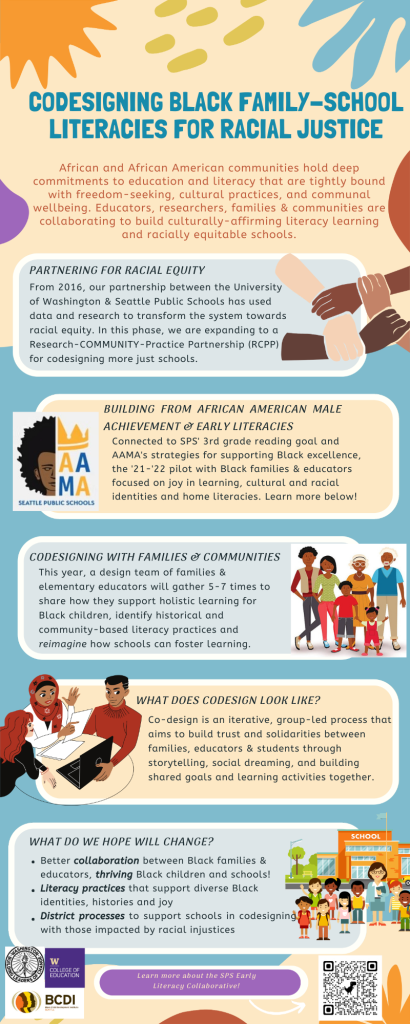
We launched the ELC with families, educators, and school leaders in June 2023 at the Northwest African American Museum. Elder Donald Felder, retired educator and Black community leader, opened the event by sharing stories of his experiences as a student and educator.
Then, families drew responses to the prompt, draw a place of joy or learning that matters to your family or community. This ushered in discussion about the important places that matter for their families learning and shared growth. Their drawings were pieced together to create a collective, paper quilt.
We story quilted again to culminate the 2023-2024 ELC year. This time, we “quilted” responses to the prompt, draw your dream place of learning for your child (for families and educators), or your dream place of learning (for students). These images design a large crow, an important character in our codesign product! See below for both images.
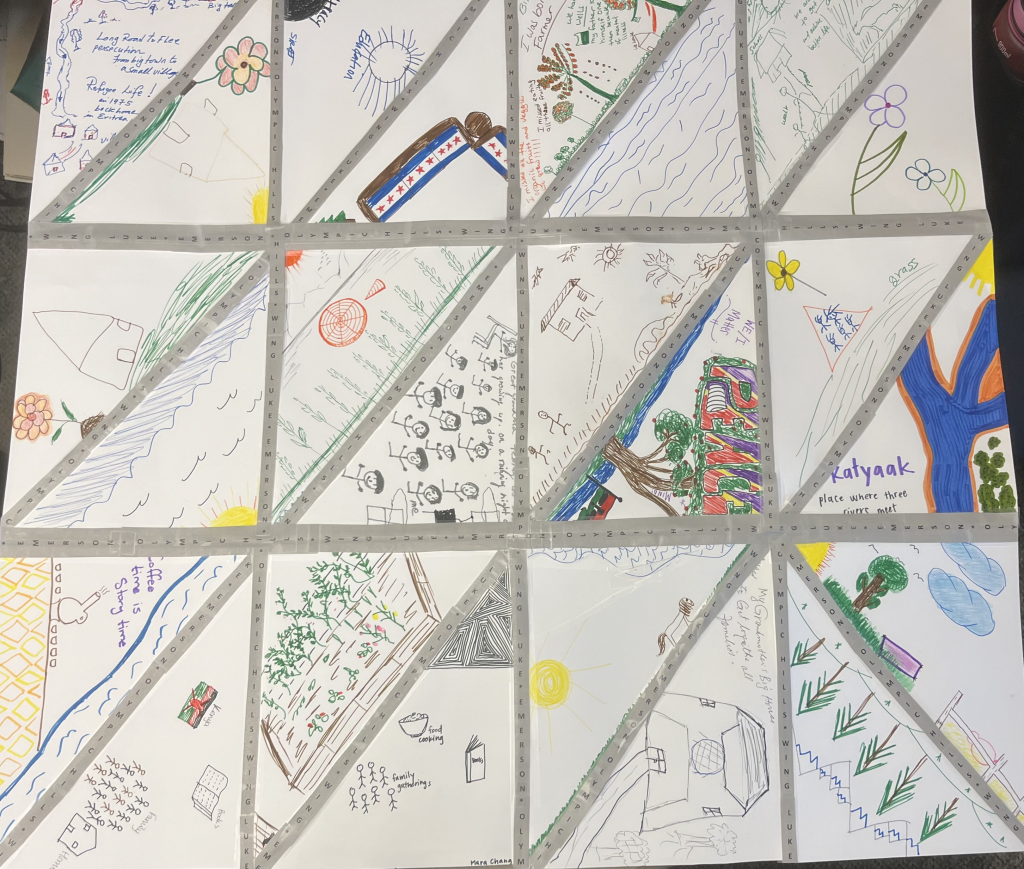
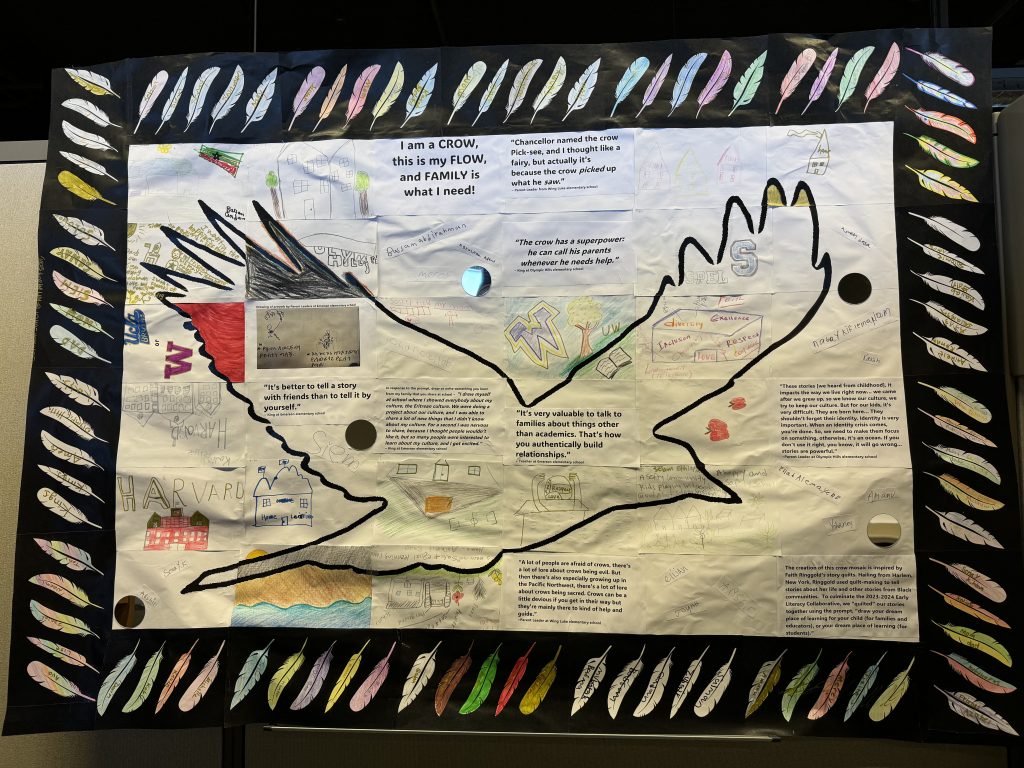
Our codesign process happened at two levels:
- The local level codesign refers to the collaboration between Black youth, their families, educators, school leaders, district leaders, and university researchers. We hosted monthly local codesign meetings, which consisted of discussions about how East African and African American families negotiate linguistic, religious, and value differences between home and school, and activities where families’ shared their expansive, home- and community-based literacy practices. The local codesign sessions were an intergenerational space of learning, centering the brilliance and creativity of students and families.
- The system level codesign refers to the RCPP’s regular meetings to identify systemic routines, professional learning, and measurements rooted in learning from the local codesign. The RCPP has worked to analyze data and translate learnings back to the system, in order to establish processes of collaboration, practices of critical literacy, and measures of student engagement and wellbeing.
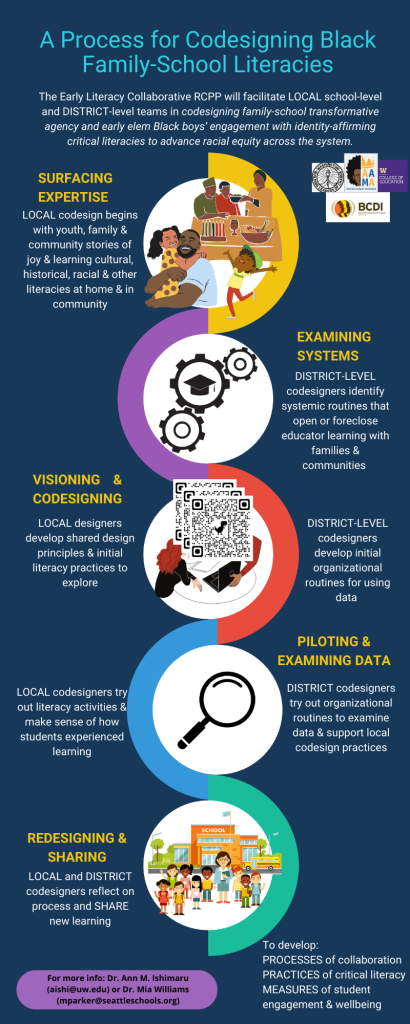
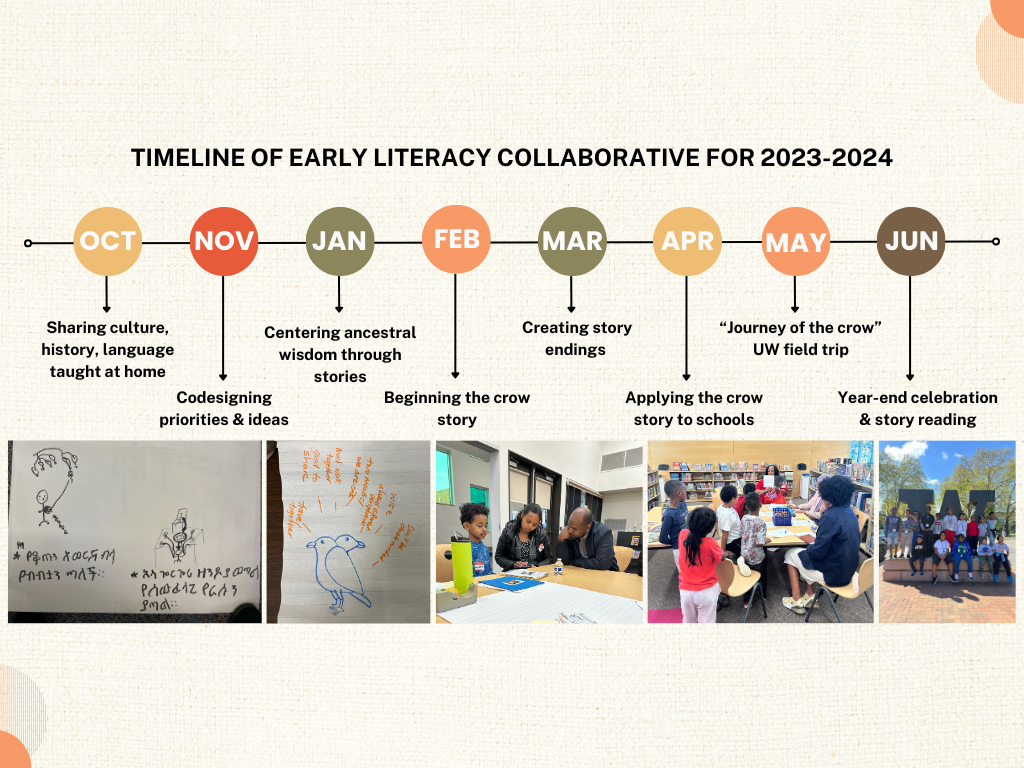
Local Codesign Sessions – Agenda Structure
We adapted TechTale‘s Facilitator Guides to structure the agenda for local codesign sessions:
- Meetings opened with a welcome and sharing component. Initially, these icebreakers were led by members of the RCPP and focused on the team introducing themselves. As the project continued, families and school staff opened our sessions. Opening activities spanned from “would you rather” questions to families sharing stories they read and tell to their children.
- Next, we would move into a storytelling activity. This portion of the activity varied in how it looked. Often, families would engage in a story-sharing activity, like sharing cultural stories or proverbs, or making connections to a Black critical literacy material (e.g., listening to an Anansi story and drawing parallels to their own cultural stories).
- We then would do an exploring activity that was either a hands-on activity (e.g., drawing or writing story endings), or a discussion-based activity to make decisions about what happens next or to share reflections.
- We would close by acknowledging the activities from the session. Often, we’d have a reflection question to go around and answer; and there was space for announcements about upcoming activities and our next meeting.
Initially, our meetings were held on Zoom. In Winter/Spring 2024, we began meeting in-person at the partnering school buildings. There was a felt difference being together in person! It deepened families engagement and connections to one another. Our in-person sessions always began with dinner before moving into the formal agenda. Breaking bread together was a key part of how we informally got to know another and developed relationships.
Our Design Principles
An important aspect of codesign is to establish a set of shared commitments and values for the collaboration. After our first meeting, the systems level codesign team analyzed the conversations from the first local codesign session, particularly focusing on how families addressed the prompt, what do you already do to teach your children about their culture, history, language, etc.? We surfaced a set of design principles to discuss at the second codesign session.
Families iterated upon the design principles and collectively established the following principles (translated into Somali, Amharic, and Tigrinya – other primary languages in the local codesign team).
- Incorporate home languages to maintain connections with families, communities and places
- Honor and invite varied experiences, different histories, and multiple identities across generations
- Create opportunities for families to share stories, understandings, and care
- Educators learn from students and families to partner and build from their expertise about their cultures, language and literacies
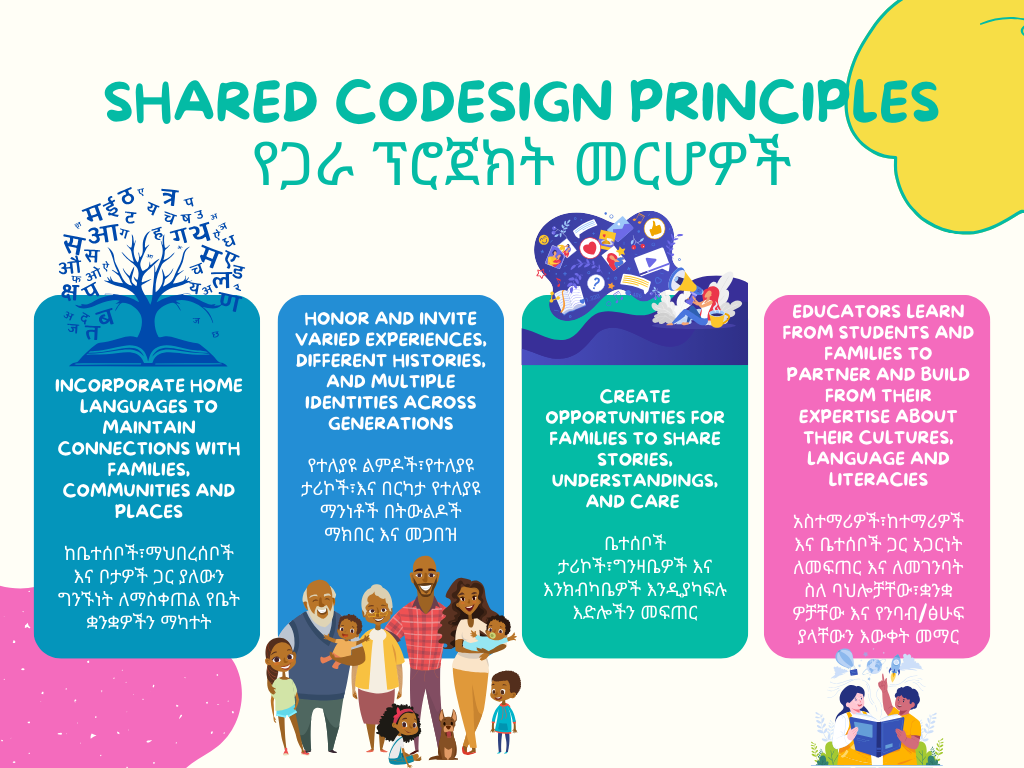

Picksee: The Curious Little Crow
Through iterative and creative interactions, the team created a story called, Picksee: The Curious Little Crow. The story emerges from their proverbs and stories, and discussions about finding harmony between students’ school contexts and ancestral, community, and cultural knowledges. The story is written in English as well as Amharic, Tigrinya, and Somali, the three other primary languages spoken by families in the local codesign team. Read and download the story below!
Additional Resources
We developed two surveys for school leaders and classroom teachers to measure student literacy, school belonging and relationships, identity and culturally responsive teaching, family and cultural capital, and how learning from home applies to school. The short surveys consist of 6-9 survey items, and a drawing prompt for students to describe and discuss.
The survey includes adapted measures from Hiramori et al (2023) (e.g., “my family teaches me important lessons”), adapted measures from Seattle Public Schools’ Student Climate Survey (e.g., “the books I read at school have people who look like me”), and novel measures (e.g., “draw or write about a time when you shared a family lesson at school with your teachers or friends”).